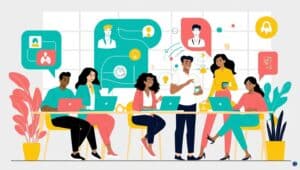Millennials, the dynamic force driving today’s workforce with their unique perspectives and digital prowess, are reshaping traditional workplace dynamics. By 2025, a staggering 75% of the global workforce is anticipated to comprise Millennials, making it crucial to understand and leverage their potential effectively.
In this blog post, we delve into the realm of Millennials in the workplace, exploring key strategies to unlock their full capabilities and foster a more engaging and productive work environment. Despite being the largest segment in many organisations, reports show that only 29% of Millennials feel truly engaged at work, highlighting the importance of addressing their needs and aspirations.
By uncovering the truths about Millennials in the workplace and acknowledging their blend of independence and desire for growth, we aim to provide actionable insights for employers and leaders seeking to harness the power of this generation. Stay tuned as we unveil 10 powerful tips to empower and inspire Millennials toward greater success and satisfaction in the modern work landscape.
Tip 1: Prioritize Flexibility
In today’s dynamic work landscape, prioritizing flexibility has become crucial for organizations looking to attract and retain millennial talent. Embracing flexible work arrangements not only enhances employee satisfaction but also boosts productivity and overall company performance.
Embrace Remote Work and Flexible Schedules
Allowing employees to work remotely or adjust their schedules to better suit their needs can lead to increased job satisfaction and morale. With advancements in technology, many tasks can be efficiently completed from any location. This flexibility enables employees to achieve a better work-life balance and can result in higher levels of engagement.
Promote Work-life Balance
Encouraging a healthy work-life balance is essential for employee well-being. By advocating for boundaries between work hours and personal time, organizations can prevent burnout and improve overall job satisfaction. Providing resources for mental health support and flexible working hours can contribute to a more productive and motivated workforce.
Encourage Autonomy and Trust
Empowering employees with autonomy in their roles fosters a sense of trust and responsibility. When workers feel trusted to manage their tasks independently, they are more likely to demonstrate ownership and accountability in their work. This autonomy can lead to increased creativity, problem-solving skills, and job satisfaction among employees.
Prioritizing flexibility through remote work options, promoting work-life balance, and nurturing autonomy and trust in the workplace are integral steps toward creating a positive and productive environment for the millennial workforce.
Tip 2: Foster Open Communication
Effective communication is crucial in any workplace, especially for the millennial workforce. To create a conducive environment for open communication, organizations must focus on fostering transparency, encouraging feedback, and implementing open-door policies.
Create a Culture of Transparency
Transparency is the cornerstone of open communication. By being transparent with your employees, you build trust and create a more engaged workforce. Share information about the company’s goals, strategies, and decisions openly. When employees feel informed, they are more likely to contribute positively to the organization.
Encourage Feedback and Active Listening
Feedback is a two-way street that requires active listening from both parties. Encourage employees to share their thoughts, ideas, and concerns openly. Actively listen to their feedback and show that you value their input. Constructive feedback helps in continuous improvement and strengthens the relationship between employees and management.
Implement Open-door Policies
Open-door policies create an environment where employees feel comfortable approaching their managers with any issues or suggestions. This approach eliminates barriers and hierarchies, promoting better communication across all levels of the organization. It demonstrates that all voices are heard and valued, leading to a more inclusive workplace culture.

Tip 3: Provide Continuous Learning Opportunities
Continuous learning is vital in today’s fast-paced work environment to keep employees engaged and motivated. Here are some effective ways to provide continuous learning opportunities:
Offer Professional Development Programs
Investing in professional development programs can greatly benefit your millennial workforce. These programs can include workshops, seminars, online courses, and certifications to help employees enhance their skills and knowledge. By offering these opportunities, you show your commitment to their growth and development within the company.

Encourage Skill-building and Cross-training
Encouraging skill-building and cross-training among employees can foster a culture of continuous learning. By allowing employees to learn new skills and explore different roles within the company, you not only increase their value but also boost overall team productivity. Cross-training can lead to a more versatile and adaptable workforce.
Promote a Growth Mindset
Promoting a growth mindset within your millennial workforce can have a significant impact on their attitude towards learning and development. Encourage employees to embrace challenges, learn from failures, and see obstacles as opportunities for growth. By fostering a culture that values continuous improvement and learning, you create a more resilient and innovative team.
By implementing these strategies, you can create a workplace culture that values continuous learning and growth, leading to a more motivated and skilled millennial workforce.
Tip 4: Leverage Technology
In today’s dynamic workplace environment, leveraging technology is essential for maximizing productivity and collaboration. By embracing the latest tools and platforms, companies can streamline processes and empower their workforce. Let’s delve into three key strategies to effectively utilize technology in the workplace.
Adopt Collaborative Tools and Platforms
Utilizing collaborative tools is crucial for enhancing teamwork and communication within a distributed workforce. Platforms like Slack, Asana, and Trello facilitate real-time interaction, task management, and project tracking. These tools promote transparency and efficiency, enabling seamless collaboration regardless of physical location.

To explore further about collaboration tools, check out 10 Best Collaboration Tools for Remote Teams and Top 36 Collaboration Tools & Software For Teams in 2024.
Encourage Digital Literacy
Promoting digital literacy among employees is vital for ensuring they are adept at using technology effectively. Providing training sessions and resources can empower staff to navigate digital tools with confidence. Cultivating a culture of continuous learning enables individuals to stay abreast of technological advancements and boosts overall proficiency.
Embrace Innovation and Automation
Embracing innovation and automation in workflows can significantly boost efficiency and productivity. Implementing tools such as AI-driven software and automated processes can streamline repetitive tasks, allowing employees to focus on high-value activities. By adopting innovative technologies, businesses can stay competitive and drive growth in today’s fast-paced digital landscape.
Incorporating technology-driven solutions into the workplace empowers employees to work smarter, collaborate seamlessly, and drive innovation. By embracing a tech-savvy approach, organisations can unlock new possibilities and stay ahead in the ever-evolving business landscape.
Cultivate a Positive Work Culture
Creating a positive work culture is essential for the well-being and productivity of employees. Cultivating a positive work culture involves promoting values like diversity and inclusion, encouraging social responsibility, and celebrating achievements and milestones.
Promote Values like Diversity and Inclusion
Promoting diversity and inclusion in the workplace fosters a sense of belonging and respect among employees. Embracing a diverse workforce not only brings different perspectives to the table but also enhances innovation and creativity. By creating an inclusive environment where everyone feels valued, respected, and empowered, organisations can improve collaboration and overall performance.
Encourage Social Responsibility
Encouraging social responsibility within the workplace can have a positive impact on both the community and employees. Engaging in corporate social responsibility initiatives, such as volunteering programmes or environmental sustainability projects, can boost employee morale and engagement. It also helps to create a sense of purpose and pride among employees, knowing that their organisation is making a meaningful contribution to society.

Celebrate Achievements and Milestones
Recognizing and celebrating achievements and milestones is crucial for employee motivation and retention. Whether it’s meeting project deadlines, reaching sales targets, or work anniversaries, acknowledging these accomplishments can boost morale and foster a positive work culture. Celebrations can range from simple gestures like shout-outs in team meetings to more elaborate events or rewards to show appreciation for employees’ hard work and dedication.
Tip 6: Offer Meaningful Work
When it comes to engaging Millennials in the workforce, offering meaningful work is a crucial aspect that can boost motivation and productivity. Let’s explore some effective strategies to provide meaningful work experiences for Millennials:
Align Individual Goals with Company Objectives
One way to offer meaningful work to Millennials is by aligning their personal goals with the broader objectives of the company. By establishing clear connections between what employees want to achieve personally and what the organization aims to accomplish, individuals feel a sense of purpose and impact in their roles. This alignment can lead to increased job satisfaction and a stronger commitment to the company’s mission.
Provide Opportunities for Impact and Contribution
Millennials often seek opportunities to make a tangible difference in their work. By providing them with projects and responsibilities that allow them to see the direct impact of their contributions, you can create a sense of fulfilment and significance. Encouraging a culture where employees understand how their work contributes to the overall success of the business can lead to higher levels of engagement and motivation.

Encourage Creativity and Innovation
Another way to offer meaningful work to Millennials is by fostering a work environment that encourages creativity and innovation. Providing opportunities for employees to think outside the box, experiment with new ideas, and contribute their unique perspectives can ignite their passion for their work. Embracing a culture of creativity can lead to fresh solutions, increased job satisfaction, and a sense of fulfilment in their roles.
By implementing these strategies and prioritizing meaningful work experiences, employers can create an engaging and fulfilling environment for Millennials in the workforce.
Recognize and Reward
Recognizing and rewarding employees for their hard work and dedication is crucial in fostering a positive work environment. Implementing various strategies can boost morale and motivate the millennial workforce toward achieving both personal and organizational goals.
Implement Performance-based Incentives
Performance-based incentives are a great way to acknowledge employees’ individual contributions to the company. By setting clear goals and rewarding those who meet or exceed expectations, you can inspire a culture of excellence and drive among millennials. Incentives could include bonuses, extra paid time off, or even career advancement opportunities.
Offer Competitive Compensation Packages
Providing competitive compensation packages is key to attracting and retaining top talent in the millennial workforce. Millennials value fair pay that reflects their skills and contributions. By offering competitive salaries, performance bonuses, and benefits such as health insurance and retirement plans, you show that you value your employees’ hard work and dedication.

Celebrate Successes and Contributions
Celebrating successes and contributions, no matter how big or small, is essential for employee morale and engagement. Recognising and publicly acknowledging outstanding achievements within the team can boost motivation and create a sense of camaraderie. Organise team lunches, award ceremonies, or shout-outs in company newsletters to highlight and appreciate the hard work of your millennial employees.
Tip 8: Encourage Collaboration
In today’s dynamic work environment, encouraging collaboration among millennials can significantly enhance productivity and creativity within teams. By fostering teamwork, promoting knowledge sharing, and embracing diversity of thought, organisations can harness the full potential of their millennial workforce.
Foster Teamwork and Cross-functional Projects
Encouraging teamwork is essential for millennials to thrive in the workplace. By fostering a collaborative environment where individuals work together towards common goals, teams can leverage each other’s strengths, enhance problem-solving capabilities, and build strong relationships. Assigning cross-functional projects can further stimulate collaboration by bringing diverse expertise and perspectives together to tackle challenges.
Promote Knowledge Sharing
Knowledge sharing is a vital component of collaboration among millennials. Organisations can promote knowledge sharing through platforms such as team meetings, workshops, and digital tools that facilitate communication and information exchange. Encouraging employees to share their expertise, experiences, and best practices not only benefits individual growth but also enriches the collective knowledge pool of the team.
Embrace Diversity of Thought
Embracing diversity of thought involves valuing and respecting different viewpoints, backgrounds, and approaches within a team. Millennials bring a wealth of diverse experiences and ideas to the table, and by creating an inclusive environment that celebrates this diversity, organizations can foster innovation and creativity. Encouraging open dialogue, active listening, and constructive feedback among team members can lead to breakthrough solutions and improved decision-making processes.
By prioritizing collaboration, organizations can empower their millennial workforce to work cohesively, share knowledge effectively, and leverage the unique perspectives of each team member. Through fostering teamwork, promoting knowledge sharing, and embracing diversity of thought, businesses can create a vibrant and inclusive work culture that drives success in today’s fast-paced world.
Prioritize Well-being
In today’s fast-paced work environment, prioritizing well-being is essential for the mental and physical health of Millennials in the workforce. Companies that focus on the well-being of their employees not only enhance productivity but also create a positive and supportive work culture. Here are some strategies to help prioritise well-being.
Offer Wellness Programs and Resources
Providing wellness programs and resources can significantly impact the overall well-being of employees. These programs can include fitness classes, meditation sessions, nutrition workshops, and health screenings. By offering a variety of options, employees can choose activities that best suit their needs and preferences. Wellness programs can also foster a sense of community and camaraderie among colleagues, creating a supportive work environment.

Promote Mental Health Awareness
Promoting mental health awareness is crucial in the workplace to reduce stigma and provide support to those who may be struggling. Organising mental health workshops, seminars, or training sessions can educate employees on the importance of mental well-being and provide them with coping strategies for dealing with stress and anxiety. Creating an open and inclusive environment where employees feel comfortable discussing mental health issues can help foster a culture of understanding and support.
By prioritizing well-being through wellness programs and promoting mental health awareness, companies can show their commitment to supporting the holistic health of their employees, leading to a more engaged and productive workforce.
Lead by Example
Leading by example is a powerful way to inspire and motivate your team. Here are some key ways to effectively lead by example in the workplace:
Embody the Values You Promote
One of the most important aspects of leading by example is embodying the values you promote. If you advocate for honesty, integrity, and hard work, it is essential to demonstrate these traits in your own actions. Your team looks to you as a guide, so aligning your behavior with your stated values is crucial for building trust and respect.
Be a Role Model for Continuous Learning
As a leader, it is essential to be a role model for continuous learning. Show your team that you are committed to growth and development by seeking out new skills, knowledge, and experiences. Encourage a culture of curiosity and improvement within your team, demonstrating that learning is a lifelong journey that benefits both individuals and the organisation as a whole.
Foster a Culture of Accountability
Fostering a culture of accountability is key to effective leadership. Hold yourself accountable for your actions and decisions, and encourage your team to do the same. By taking responsibility for mistakes and celebrating successes as a team, you create a supportive environment where everyone feels empowered to contribute their best work.
By embodying the values you promote, being a role model for continuous learning, and fostering a culture of accountability, you can lead by example and inspire your team to reach new heights of success.
Learn more about effective leadership practices here.
Photo by Mikhail Nilov
FAQs
Having a workforce that includes millennials presents both opportunities and challenges for employers. Understanding their perspectives and needs is crucial for attracting, retaining, and effectively managing millennial talent. Let’s delve into some common questions employers might have about working with millennials.
How do I attract and retain millennial talent?
Attracting and retaining millennial talent requires a shift in traditional approaches. Millennials value a good work-life balance, opportunities for growth, and a positive company culture. Offering flexibility, career development programs, and emphasis on work that aligns with their values can help attract and retain millennials in the workplace. For more insights, check out these key statistics about Millennials in the workplace.
What are the key motivators for millennials in the workplace?
Millennials are driven by factors such as meaningful work, opportunities for advancement, and a supportive work environment. They seek roles where they can make a difference and contribute to a larger purpose. Understanding these motivators can help employers tailor their approaches to engage and inspire millennial employees.
How can I bridge the generational gap in my team?
To bridge the generational gap in your team, open communication and mutual respect are essential. Encouraging knowledge sharing and creating opportunities for collaborative projects can help different generations understand each other better and leverage their unique strengths. Learn more about managing millennials in the workplace here.
What are the best practices for providing feedback to millennials?
When providing feedback to millennials, focus on regular, constructive feedback that highlights both strengths and areas for improvement. Millennials appreciate clear guidance on how to develop professionally and grow within the company. Offering mentorship and coaching can also enhance the feedback process.
How can I foster a sense of purpose and impact for my millennial employees?
To foster a sense of purpose and impact among millennial employees, align their roles with the larger goals of the organization. Encourage them to participate in meaningful projects and initiatives that allow them to see the direct impact of their work. Recognizing their contributions and providing opportunities for skill development can further enhance their sense of purpose at work. For more insights, read this article on 5 truths about Millennials in the workplace.
Photo by Canva Studio
Conclusion
In conclusion, mastering the millennial workforce is crucial for the success of any modern business. With Millennials projected to make up 75% of the global workforce by 2025, understanding their needs and preferences is paramount. Engaging this generation is key to fostering a productive work environment and driving innovation.
To thrive in the ever-evolving workplace landscape, businesses must adapt to the characteristics of the millennial workforce. Embracing flexibility, providing opportunities for growth and development, and fostering a culture of inclusivity are essential steps in attracting and retaining millennial talent.
Implementing these strategies not only benefits the organization but also contributes to the personal and professional growth of employees. By embracing the millennial mindset, companies can future-proof their success and create a dynamic and engaged workforce that drives long-term prosperity.
Related Links:













